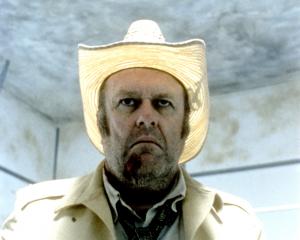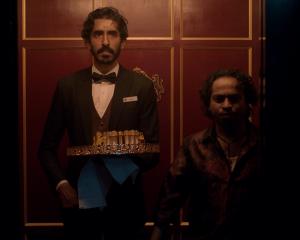
Director Richard Ayoade left the basement for a Submarine experience, reports Nina Metz, of the Chicago Tribune.
If things had turned out differently, it is possible that film director Richard Ayoade would be a recognisable American television star.
Well known in Britain as a comedic writer and performer, his distinctly off-kilter sensibility came to bear on shows such as Garth Marenghi's Darkplace (a lampoon of bad TV dramas from the '80s) and The Mighty Boosh (a surrealist sketch comedy show).
More recently he starred in The IT Crowd, a UK workplace comedy about a pair of basement-dwelling computer nerds that was adapted for American television in 2007 with Ayoade reprising his role opposite Joel McHale. The pilot was picked up by NBC, but due to a regime change at the network, not a single episode was shot beyond the pilot, and so the show died a sudden and untimely death.
It is probably just as well. If Ayoade was tied up with a sitcom, he most certainly would have missed out on the opportunity to write and direct his first feature-length film, a coming-of-ager called Submarine.
Set in 1980s Wales, it bears some stylistic and thematic similarities to films of the French New Wave, as well as Wes Anderson's Rushmore.
Adapted from the 2008 novel by Joe Dunthorne (also called Submarine), the film centres on the experiences of Oliver, a 15-year-old boy who meddles in his parents' disintegrating marriage when he's not obsessing about his own virginity and an enigmatic girl at school who has caught his eye.
To hear London-based Ayoade tell it, he much prefers to be behind the camera anyway.
Q If the American version of The IT Crowd had worked out, your life would be very different right now and you would probably be living in LA. Were you disappointed with the outcome?
A It seemed so unimaginable because so many pilots don't get picked up - as a betting person you kind of bet against it, so I didn't imagine that it was going to happen. But then it was picked up, and that was kind of terrifying for a short period because it just, I don't know, I had just got married and I felt like I would be uprooting us both.
Q I read a quote where you said the making of Submarine was excruciating.
A I could well have been joking.
Q Are your droll responses frequently misunderstood?
A Yeah, but that's probably my fault because I'm not funny enough. Making the film is really enjoyable when you're actually making it; watching it back with other people is excruciating - sort of presenting it and all of that kind of self-regard. It feels completely inappropriate to try to persuade people to see something you've done. It feel like lobbying for your own exam results.
Q You're not fully comfortable going out and promoting your movie, I gather.
A It is a bit like an abstract expressionist who would not feel very comfortable expressing themselves verbally, but then be called upon to describe a painting. You have spent your entire life trying to avoid having to verbalise things, and you are immediately put back in that arena that you are fleeing from.
With writers - because you're not terribly socialised or verbally dexterous in reality - you're composing things in a more structured, controlled way. [But once people come in contact with the work] you're immediately thrown back into extemporising about it in a non-controlled, potentially trivial and rubbish manner.
I literally don't think that the things I say off the top of my head are particularly worthy of record - but they do become worthy of record. Everything is recorded now, I find. I wonder whether there's going to be an infinite archive in the future where everyone has five hours of footage of themselves a day to contend with.
Q A profile on you that ran in The Guardian a few years back asked, "What's behind the loser act?" and a fan posting online elsewhere answered with this bit of praise: "He's so talented [at] pretending he's not talented."
A Yeah, well that makes it sound like it's completely disingenuous shtick, which of course, it is - it's incredibly, dangerously, Donald Trump-level arrogance. Yeah. This is a construct.
Q You've made analogies between Submarine and Taxi Driver, although I'm not sure the connection is obvious.
A It's the main influence, not simply because of the voice-over and the tone of the voice-over - and Oliver has elements of the psychopath to him - but it's someone who has a heroic view of themselves (like Travis Bickle), and the camera is complicit in that. That's how it's filmed, with a kind of sympathy for this existentialist, loner romantic figure. And because of Oliver's age, there's something about, the more seriously the film appeared to take [his self regard], the more absurd it is.












